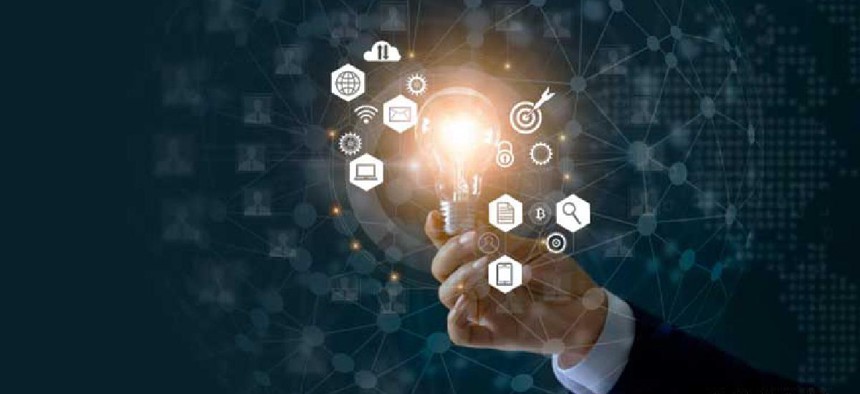Connecting state and local government leaders
As state and local agencies adopt automation, cloud and IoT technologies to improve their services and citizens' experience, they must also incorporate automated defenses to mitigate associated risks.
Government agencies are expected to deliver transformative services at digital speeds just as private-sector organizations do. Connected consumers have become accustomed to having information and services readily accessible at a moment’s notice through any medium -- from desktops, mobile devices or connected cars. Now connected citizens are demanding to interface with their government at any time, on the device of their choice, accessing the same type of innovative, highly customized services offered by digital-native businesses.
Adopting new technologies promises to improve the user experience, make government agencies more efficient, streamline workflows, reduce costs and drive dramatic productivity and quality-of-life improvements. That is why digital transformation is a priority across state and local governments.
In fact, the list of State CIO Top Ten Priorities for 2017 revealed that the technologies enabling transformation -- including internet-of-things deployment, legacy IT modernization, cloud adoption and data management and analytics -- are top of mind for forward-thinking leaders.
As government agencies make plans for increased accessibility to digital services and enhanced user experience, three key technologies have emerged: IoT, cloud and automation.
Internet of things. State and local governments are increasingly investing in connected devices and applications to improve key public services such as transportation, security, public health and even tourism. These devices can simplify communication between elected officials and citizens using real-time data. For example, state governments can provide updates on road conditions, distribute accurate traffic information or provide tourists with information on significant landmarks. The abundance of real-time data provided through IoT enables a wide range of proactive and predictive analytics, allowing public-sector organizations to better serve constituents through optimized resource allocation and just-in-time service delivery. For example, if citizens could let city hall know about new potholes via mobile apps, that information could in turn drive accurate road condition notices and accelerated repairs.
Cloud. Government agencies have also turned their focus to cloud adoption, with a recent survey showing that 76 percent of agencies planned to increase cloud spending. The scalability of cloud facilitates the increase in connected devices and applications, offering the necessary storage and computing capabilities to make this data actionable. This technology will be key as a more connected society generates huge volumes of data. Finally, cloud's lower up-front cost n offers a simple transition from legacy IT systems.
Automation and artificial intelligence. Agencies have begun to automate tasks using AI and machine learning techniques that enable programs to learn and carry out mundane but important processes that had previously been done by employees. Automation gives the time spent doing more menial task back to employees, allowing them to focus on work that requires more nuance. AI can also analyze network performance and detect anomalous behavior at machine speed.
Concerns for state and local agencies
While these three technologies offer immense benefits for state and local agencies, they also open up and expand agencies' attack surface for cybercriminals. This is especially true as cybercriminals develop advanced methods gain access to applications and data by bypassing traditional cybersecurity measures.
Hackers frequently target government agencies' networks and hybrid clouds because they host applications and workloads such as payment systems, public safety platforms, emergency communications and a host of mission-critical systems. These ecosystems also process and store a wide range of personally identifiable information of employees and citizens. That is why cybersecurity and risk management remain the No. 1 priority of state CIOs.
To effectively realize productivity and quality-of-life gains from IoT, cloud and automation, public-sector agencies must, at the same time, implement appropriate security measures.
Automated response to automated threats
Just as state and local agencies are adopting AI and automation to become more effective and efficient, so are cybercriminals. Using stolen cloud services, cybercriminals now carry out advance, AI-enabled, data-intensive attacks. These automated attacks can be carried out in rapid succession, making it impossible for security teams to manually monitor each security event.
In 2017, ransomware as a service and malware as a service became commonly available on dark web marketplaces. The Q4 2017 Threat Landscape Report discussed in detail the evolution of IoT-based, automated attacks packing sophisticated adaptive techniques to detect and exploit multiple vulnerabilities in devices, applications and platforms.
As attacks become more sophisticated, agencies must adopt AI and machine learning to automate detection and mitigation of threats. These technologies can greatly enhance agencies' understanding of their risk posture in terms of critical systems, dependencies and business impact. Such automation can be used to rank data, systems and users based on levels of trust or potential for compromise. Automation should also be leveraged for asset and vulnerability management. These mundane but critical processes should no longer be performed by expensive and hard-to-retain security talent.
A fabric-based approach provides proactive and predictive defense in depth through a security architecture based upon intelligence and automation. It can protect networks from IoT endpoints through to cloud environments by sharing and correlating intelligence that can then be automatically acted upon to detect and prevent threats. This helps shorten response cycles, especially across distributed networks.
As state and local agencies adopt automation, cloud and IoT technologies to improve their services and citizens' experience, cybercriminals are using similar technologies to exploit network security weaknesses. Agencies that incorporate automated defenses across the increasingly distributed environment can mitigate risks and reap the benefits of digital transformation.
NEXT STORY: How Alexa mines open data



